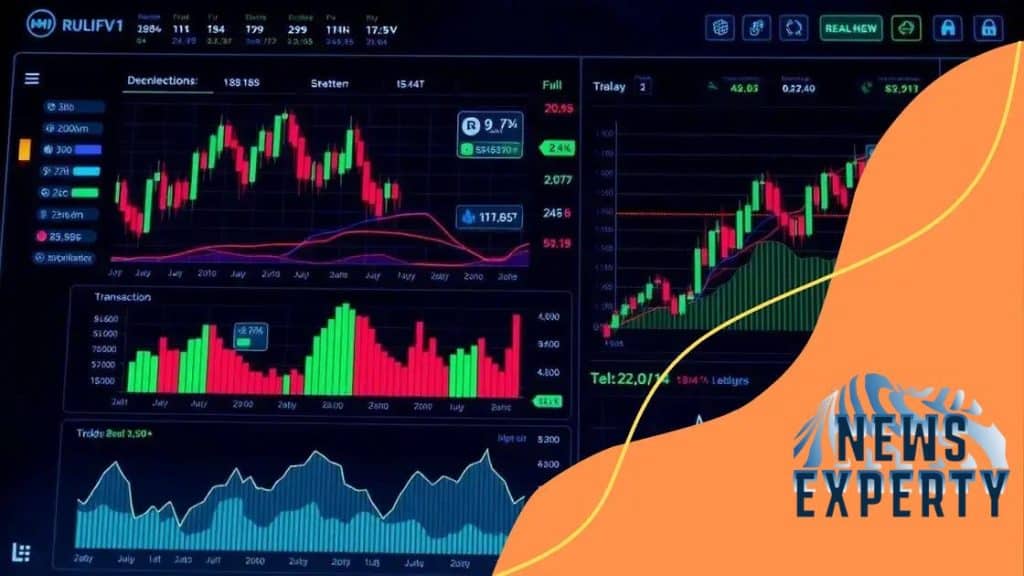How blockchain is transforming the stock trading landscape

Anúncios
Blockchain is transforming the stock trading landscape by enhancing transparency, security, and efficiency, while decentralized finance (DeFi) platforms offer new opportunities for trading without traditional intermediaries.
How blockchain is transforming the stock trading landscape is changing the game for investors and institutions alike. With increased transparency and efficiency, it’s now crucial to explore the implications of this technology. Are you ready to dive into its benefits and challenges?
Anúncios
Understanding blockchain technology
Understanding blockchain technology is essential for grasping its role in various industries, especially in finance. At its core, blockchain is a decentralized system that allows data to be stored across a network of computers. This ensures higher levels of security and transparency, as no single entity controls the information.
Key Features of Blockchain
The key features that make blockchain stand out include its decentralized nature, security through cryptography, and the use of consensus mechanisms.
- Decentralization: Information is distributed across a network, reducing the risks associated with centralized control.
- Immutability: Once recorded, data cannot be easily altered or deleted, ensuring integrity.
- Transparency: All transactions are visible to participants within the network, fostering trust.
- Security: Cryptographic techniques protect data from unauthorized access.
These features build a framework through which secure transactions can take place without the need for intermediaries. For instance, in stock trading, this means that buyers and sellers can interact directly, enhancing efficiency and reducing costs. As we dive deeper, it’s important to recognize that the technology isn’t just a trend; it represents a significant shift in how transactions occur.
Anúncios
How Blockchain Works
The foundation of blockchain technology lies in a process called mining. When a transaction occurs, it is grouped with others into a block. Miners then validate this block, ensuring all transactions are legitimate before adding it to the chain.
This process of verification leads to a chain of blocks, hence the name blockchain. Each block contains a unique code called a hash that’s tied to the previous block, reinforcing the security of the entire blockchain. Additionally, many blockchains use consensus algorithms like Proof of Work to secure the network and validate transactions.
As we explore the impact of blockchain on stock trading, understanding these basics lays the groundwork for appreciating its transformative potential. By ensuring transparency and reducing transaction times, blockchain technology could revolutionize the way we think about and engage with stock markets, paving the way for a more efficient future.
Benefits of blockchain in stock trading
Benefits of blockchain in stock trading are numerous, offering significant improvements over traditional systems. One of the most notable advantages is transparency. All transactions are recorded on the blockchain, making it easy for participants to verify details without the risk of fraud. This level of visibility fosters greater trust among investors.
Enhanced Security
Another key benefit is enhanced security. Blockchain’s decentralized nature makes it less vulnerable to hacks or data breaches compared to centralized databases. Each transaction is encrypted and linked to the previous one, creating a secure and unchangeable record.
- Reduced Fraud: With each transaction being transparent and immutable, the opportunity for fraudulent activities is minimized.
- Lower Costs: By eliminating the need for intermediaries, such as brokers, blockchain can reduce transaction costs significantly.
- Faster Transactions: Blockchain can streamline processes, allowing for quicker settlement times compared to traditional methods.
- Increased Accessibility: Blockchain opens up stock trading to a broader audience, allowing more people to invest easily.
Furthermore, blockchain technology can drastically reduce the time it takes to settle trades. A typical stock transaction can take days to process, but with blockchain, this can happen in real-time. This speed can lead to better capital efficiency for traders and companies alike.
Decentralized Finance Integration
Additionally, the integration of decentralized finance (DeFi) with blockchain brings new possibilities to the stock trading landscape. This allows for innovative financial products and services, offering new ways to trade assets.
Moreover, the rise of tokenization of assets means that stocks can be represented as digital tokens on a blockchain. This innovation expands market access and provides liquidity in ways not previously possible.
As blockchain continues to evolve, understanding its benefits in stock trading becomes vital for investors and financial institutions. With its promise of increased security, transparency, and efficiency, it could reshape the stock trading landscape fundamentally.
Challenges of adopting blockchain

Challenges of adopting blockchain can be significant, despite its many advantages. One of the primary hurdles is the complexity of the technology itself. Many organizations find it difficult to understand how blockchain works and how to integrate it into their existing systems, which can lead to resistance from stakeholders.
Regulatory Uncertainty
Another challenge is regulatory uncertainty. As blockchain technology evolves, regulations have not kept pace. Companies may hesitate to adopt blockchain due to unclear rules regarding compliance and legal issues.
- Lack of Standards: Inconsistent standards make it difficult for different blockchain systems to communicate effectively.
- Privacy Concerns: While transparency is a benefit, it can also raise privacy concerns for users and companies.
- Integration Issues: Incorporating blockchain into existing infrastructures can be complicated and costly.
- Scalability: Many blockchain systems struggle to handle a large number of transactions quickly, limiting their effectiveness.
The expense of implementing blockchain can also deter organizations. Initial setup costs and ongoing maintenance may be higher compared to traditional systems, particularly for smaller businesses. These cost concerns lead to significant hesitation when evaluating whether blockchain is the right fit.
Skill Gap
Moreover, there is a distinct skill gap in the workforce related to blockchain technology. Finding skilled developers who understand how to create and manage blockchain applications can be challenging. This shortage of talent can slow down adoption and implementation.
Even as companies confront these challenges, the potential benefits of blockchain technology remain compelling. Understanding these barriers is crucial for organizations looking to harness the power of this innovative technology and make informed decisions about its integration into their operations.
Case studies of blockchain implementation
Case studies of blockchain implementation provide valuable insights into how this technology is transforming various industries. Numerous organizations have successfully integrated blockchain to enhance operations, transparency, and security.
Financial Services
One prominent example is in the financial sector. Companies like JPMorgan Chase have developed their own blockchain networks, such as Quorum, to facilitate secure and efficient transactions between banks. This implementation aims to streamline processes that typically take days, allowing for nearly instant settlement of trades.
- Increased Efficiency: By using blockchain, these firms reduce the time and cost associated with traditional banking systems.
- Improved Security: The decentralized nature of blockchain enhances the security of financial data.
- Enhanced Compliance: Blockchain allows for better tracking of transactions, aiding in regulatory compliance.
Another case study highlights the use of blockchain in supply chain management. Companies like Walmart have implemented blockchain to track the provenance of their food products. By doing so, they can enhance food safety and traceability.
Supply Chain Management
This allows Walmart to quickly identify the source of contamination during a food safety crisis, significantly reducing response times and potentially saving lives.
Moreover, the technology fosters greater transparency and trust between suppliers and retailers, as all parties can access the same information on the blockchain. This shared view of data reduces disputes and improves collaboration.
In addition to finance and supply chain management, the healthcare sector is exploring blockchain use. For instance, companies are working on solutions to secure patient records and streamline data sharing among healthcare providers.
Healthcare Innovations
By utilizing blockchain, healthcare organizations can ensure that sensitive information remains private and only accessible to authorized individuals. This not only protects patient data but also improves interoperability among various health systems.
These case studies illustrate just a few of the exciting possibilities blockchain technology offers across different sectors. As more organizations continue to implement blockchain solutions, the impact on efficiency, security, and transparency will undoubtedly grow.
Future trends in stock trading
Future trends in stock trading are set to be shaped significantly by advancements in technology, particularly in blockchain and artificial intelligence. As the investment landscape evolves, traders and investors must stay informed about emerging trends to remain competitive.
Rise of Decentralized Finance (DeFi)
One major trend is the rise of decentralized finance (DeFi). DeFi platforms provide alternative financial services without traditional intermediaries, allowing users to trade, lend, and borrow directly. This shift leads to greater accessibility for investors and potentially lower transaction costs.
- Expanded Access: DeFi opens doors for users who may have been excluded from conventional financial systems.
- Innovative Products: The DeFi space is continuously introducing new financial instruments, including tokenized assets and stablecoins.
- Liquidity Pools: These pools provide users with opportunities to earn returns through their crypto assets.
- Community Governance: Users often have a say in the development and governance of DeFi projects.
Additionally, artificial intelligence is expected to play a significant role in stock trading. AI algorithms can analyze vast amounts of data quickly, identifying patterns and trends often missed by human traders.
Integration of AI in Trading Strategies
Using AI brings several advantages to traders. For example, predictive analytics can help forecast market movements, allowing traders to make informed decisions.
Moreover, AI-driven personalized trading strategies can cater to individual investor preferences, optimizing risk management and enhancing portfolio performance. The combination of AI with blockchain will also improve transparency and security in trades.
Another notable trend is the increase in social trading platforms. These platforms enable investors to share strategies and insights with one another, fostering a collaborative trading environment. Users can learn from experienced traders and mirror their trades, making investing more accessible.
Growth of Social Trading
This trend promotes community engagement while potentially improving investment outcomes for less experienced traders. As these social networks grow, the sharing of information and strategies will become a powerful tool in shaping market dynamics.
Ultimately, the future of stock trading will be characterized by technological advancements that enhance efficiency, transparency, and accessibility. Investors must be prepared to adapt to these changes to leverage the benefits they offer.
FAQ – Frequently Asked Questions about Blockchain in Stock Trading
What is blockchain technology?
Blockchain is a decentralized digital ledger that records transactions across many computers. It ensures transparency and security.
How does blockchain improve stock trading?
Blockchain enhances stock trading by increasing efficiency, reducing costs, and providing a transparent and secure environment for transactions.
What are decentralized finance (DeFi) platforms?
DeFi platforms allow users to trade and manage assets without traditional financial intermediaries, making finance more accessible.
How is artificial intelligence used in trading?
Artificial intelligence analyzes large sets of data to identify patterns and make predictions, which helps traders make informed decisions.





